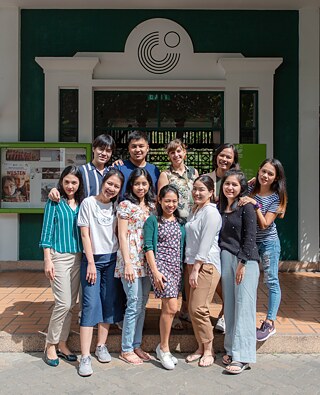SKILLED WORKERS SHORTAGE
MOVING TO GERMANY AS A HEALTHCARE PROFESSIONAL?
The Goethe-Institut Thailand is already actively supporting and offering language and cultural training to interested skilled workers abroad. These trainings prepare them for (professional) life in Germany and equips them with adequate language skills.
MOVING TO GERMANY AS A HEALTHCARE PROFESSIONAL?
Germany registers an urgent shortage of skilled workers in many occupational areas, which is already having a noticeable impact on Germany as a business location and on the stability of the social systems, among other things. In order to counter this development and to maintain a favourable position in the international competition for skilled workers, politicians drafted the Skilled Immigration Act. It is intended to react more flexibly to the current needs of the German labour market, and to offer, at the same time, appealing immigration conditions to international skilled workers. The Skilled Immigration Act, set to enter into force on 1 March 2020, is intended to facilitate the immigration of skilled workers from EU and non-EU countries in order to take up and seek employment, to streamline structures aimed at the recognition of vocational qualification and degrees obtained abroad, and to expand counselling programmes. The Goethe-Institut Thailand is already actively supporting these efforts and seeks to offer language and cultural training to interested skilled workers abroad. These trainings prepare them for (professional) life in Germany and equips them with adequate language skills.
Depending on the occupation, different levels of the Common European Framework of Reference for Languages may be required for obtaining a visa and a work permit. In healthcare professions, the B2 proficiency level is required to ensure that future healthcare workers are well-equipped to do their jobs and to communicate with German patients, relatives and colleagues. Ultimately, language training should also guarantee the basis for comprehensive integration and enable participation in the German society.

The Goethe-Institut Thailand currently offers a general B2 language course for the company CAPITALENT MEDICAL GmbH and helps prepare 14 healthcare professionals for life and work in Germany. The programme is intensive: The participants study German full-time for close to 10 months. They start without prior knowledge and finally reach B2 proficiency. The language classes take up more than half a day, with individual studying, significant amounts of homework and revisions after class, at night and on the weekends. This programme doesn’t leave much room for free time – but it offers the prospect of securing a job in Germany in the long term, thanks to language skills. At the end of the course, participants take the exam “Goethe-Zertifikat B2”, which is recognised by German authorities. Our partner CAPITALENT MEDICAL reliably takes care of further steps such as visa procurement and on-site support.
Additional linguistic and vocational training specifically for healthcare professions then takes place directly in the healthcare facility in Germany, lasting several months. The training is geared towards closing gaps in terms of terminology and knowledge and leads to full recognition as healthcare workers and nurses. It also offers possibilities to grow and advance in the occupational field of healthcare and beyond.
The recently published study on the immigration of skilled workers by the Institute for Employment Research (IAB) confirms the positive effect of the work done worldwide by the Goethe-Institut on better linguistic and intercultural qualifications of foreign skilled workers. You can find the results of the IAB study online here. In October, the Goethe-Institut also hosted the conference “Vocational education and labour mobility” on the future of vocational training in the context of the international mobility of skilled workers. More information is available here.